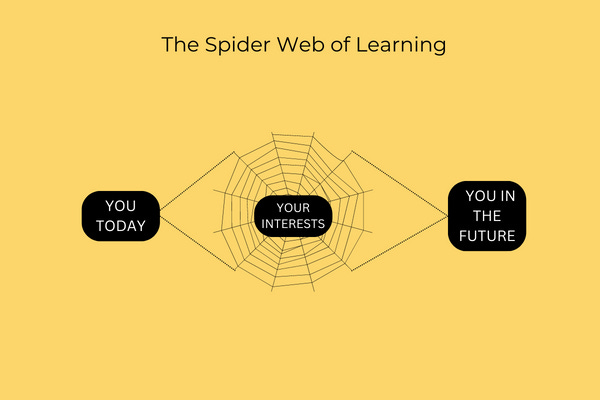The Spider Web of Learning 🕸️
Follow the 'footwebs' 👣 of a spider to learn better
One of the most formidable aspects of our conventional education system is the element of control. Our curriculum is tightly controlled, our time is regimented, and we are given limited freedom to explore. This lack of autonomy stifles curiosity, hinders exploration, and prevents us from allowing our interests to guide our learning objectives.
When I think back on my school days, I can only recall the teachers, classes, and lunch breaks, but rarely do I remember what I actually learned. This is the impact of excessive control.
In this article, we will uncover the Spider Web of Learning, how it can help us learn better with actionable insights.
The impact of control has led to three consequences:
We wonder if learning a certain skill is necessary - How often have we questioned the necessity of learning a particular skill, rationalizing that it is not directly applicable to our future jobs? This mindset stems from the belief that learning should solely serve the purpose of enhancing our professional performance.
We wonder if we can learn this skill, at this stage in our life - Throughout our formative years, the emphasis was placed on completing education milestones, such as graduation, with postgraduate studies considered an additional achievement. Today, when presented with the opportunity to learn a new skill, we may question whether we possess the capability to do so.
We let impostor syndrome lead the way - The fear of change and the feeling of being an imposter often dominate our thoughts when we dare to think broadly and ambitiously. The sense of control imposed on us acts as a deterrent, hindering our progress.
Introducing the Spider Web of Learning
Many of us are familiar with the concept of T-shaped skills, which emphasize both specialization and a broad understanding of a specific industry. In contrast, let's consider the spider web model, which focuses on our interests. Envision standing on a blank sheet of paper, jotting down your interests, and connecting them in ways that facilitate your growth as a learner.
For instance, suppose I have a desire to learn knitting. This particular interest intrigues me. Knitting not only helps me grasp patterns and establish connections between different elements but also enhances my focus, attention span, and ability to unwind after a long day of work. Knitting as a hobby offers numerous advantages that positively impact both my personal and professional life.
The Spider Web of Learning encourages us to allow our interests to guide our learning journey and establish connections among our various learning experiences.
Our traditional education system often conveys that certain skills are indispensable for our careers, while others are considered peripheral and less impactful. I aim to debunk this myth.
How can we embrace the Spider Web of Learning?
Step 1: Foster a spider web mindset
Cultivate an open and receptive mindset, ready to learn and explore. Take a blank sheet of paper, surround yourself with your interests, and consider how each one can benefit you. Some skills may directly contribute to your goals, while others may help improve your focus or well-being.
Step 2: Iterate, iterate, iterate
Spider webs are constructed and reconstructed numerous times. Similarly, our spider web of learning should be flexible. Choose three skills to prioritize and keep two additional skills on standby in case your initial selection loses its inspiration.
Step 3: Reflect and replenish
Learning should bring joy. Ensure that your spider web includes activities that fill your joy bucket. Regularly replenish this bucket by trying out different skills, even if they make you uncomfortable.
In conclusion, by embracing and allowing our interests to guide us, we can break free from the constraints of a controlled education system. Let us foster a mindset that values exploration, adaptability, and the pursuit of knowledge driven by our passions.
Unlearning Thought
Spiders are known to regrow their body parts. They are the master unlearners and relearners. How do we follow their footsteps, or rather webs?


